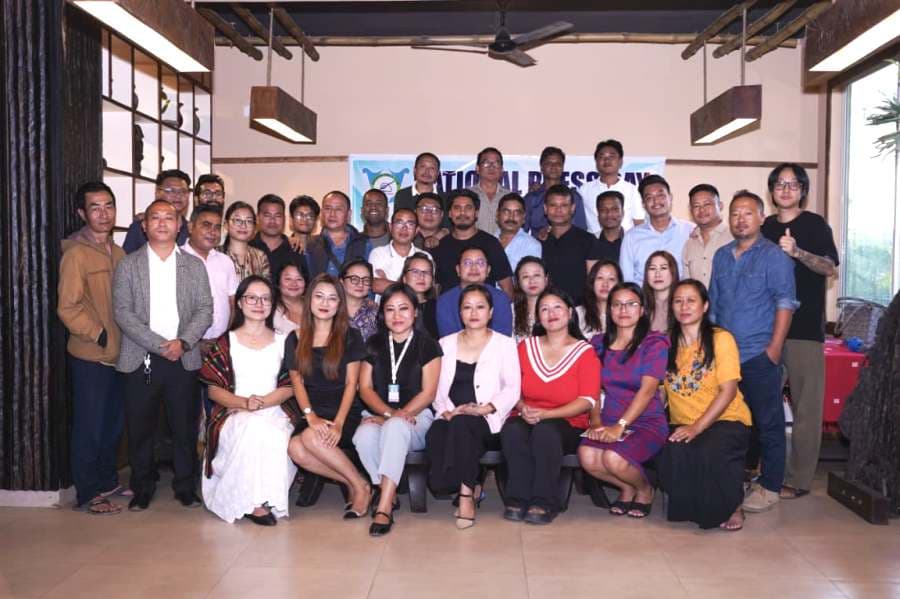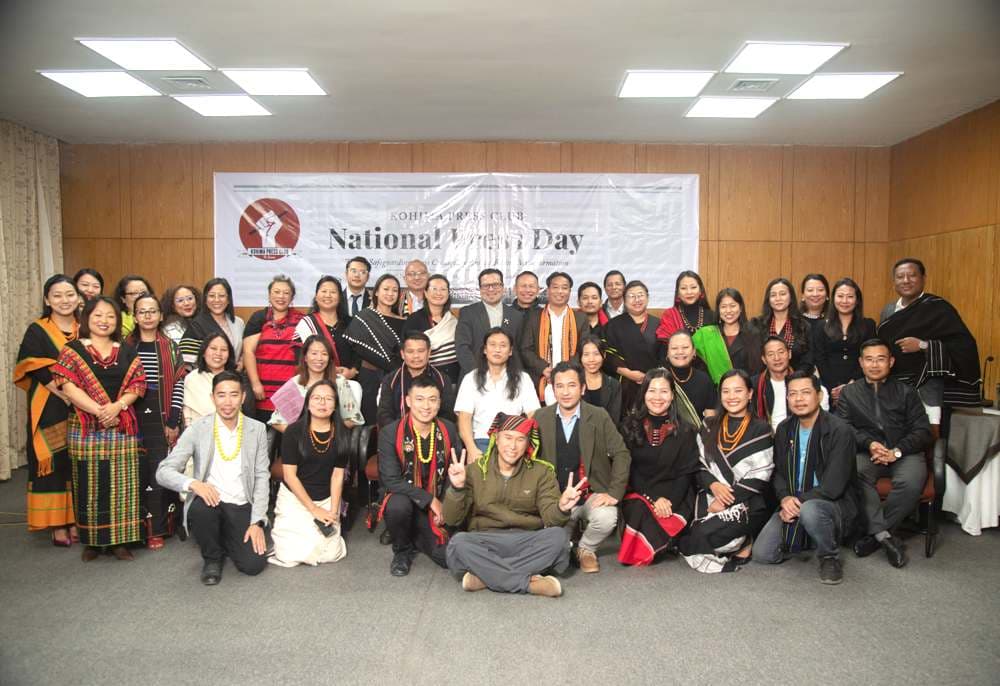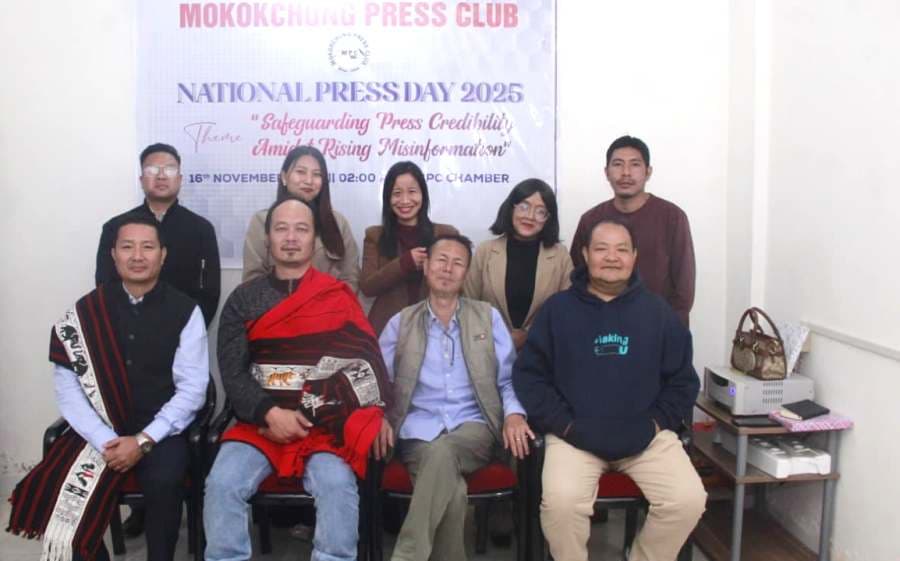Media fraternity in Nagaland observes National Press Day on the theme “Safeguarding press credibility amidst rising misinformation.”
Share
DIMAPUR/KOHIMA — The media fraternity in Nagaland, including the Dimapur Press Club (DPC), Kohima Press Club, and Mokokchung Press Club (MPC), observed ‘National Press Day’ on the theme “Safeguarding press credibility amidst rising misinformation” in their respective districts on Sunday.
DPC: The programme was held at ‘Ethnic Table,’ Notun Bosti, Dimapur, with Dr. Moalemba Jamir, associate editor of The Morung Express, as the theme speaker.

In his address, Dr. Jamir highlighted that journalists' greatest asset is their credibility, emphasising that it's not about printing presses, digital platforms, or clicks, but about their professionalism and the trust they've built as an industry.
He said the news environment has changed profoundly in recent years, where on a single screen the public encounters news reports, political messaging, rumours, entertainment clips, and promotional content all appearing in similar formats.
He said the line between what is news and what is not has been blurred. In such a situation, he said the responsibility to remain credible, fair, transparent, and accurate has become more urgent.
He said credibility allows the public to trust journalists even when truths are difficult and when facts are uncomfortable and cautioned that a lapse on the part of an outlet could affect institutions, communities, and the public at large. He said that in dealing with credibility, journalists should first look inwardly before talking about external threats.
WATCH MORE:
He stressed the need for every newsroom to be clear about who they are and how they operate, calling it central to credibility. He noted that anyone could create a page, website, or digital outlet, leading to visibility without accountability, and added that many unregulated platforms do not have clear editorial policies, websites, or even an “about us” section. He said the public sees the content but not the institution behind the news.
He also referred to ethical inconsistencies, pursuit of speed over accuracy, sensationalism, unlabelled sponsored content, commentary mixed with reporting, and failure to acknowledge mistakes, stating that these might seem minor but could erode trust over time.
Also read: National Press Day: PCI warns against AI-driven misinformation; ‘Human judgement irreplaceable’
Earlier, in her presidential address, Henlly Phom stated that the day celebrates the power of a free and fearless press. She acknowledged the efforts of journalists who work to bring truth to light and remain committed to journalistic integrity. She also urged journalists to continue striving for excellence, promoting fact-based reporting, impactful storytelling, and standing for the truth.
A short Q&A session followed, with Dr. Jamir and the Dimapur Press Club leadership responding to queries from participants.
The programme was chaired by Kekhriésenuo Lily Kiewhuo, while the vote of thanks was delivered by Niboli H. Yeptho.
KPC: The event was held at Hotel Japfü with publisher of The Morung Express Aküm Longchari as the resource person. The publisher remarked that Naga media needs to relentlessly tell fact-based stories as a way of emancipating the truth in the common interest and dignity of a shared humanity.

Longchari called upon Nagaland media to reimagine and redefine itself in these shifting times to become a credible and reliable entity with a responsibility to facilitate and even nurture critical thinking and consciousness through quality news.
Dwelling on the theme, he noted that misinformation is as old as human history, but its intensity, scope, frequency, and degree have rapidly increased even as media platforms have expanded beyond traditional forms. And yet, he said, the intent and means of disseminating information and misinformation are creating a highly polarised media ecosystem.
These conditions make it all the more important for the media to differentiate facts and non-facts.
"With prudence, the Naga media needs to engage with this question of who decides what is real. Because by implication it raises the practice of “truth sovereignty” which becomes a matter of soft power and real politik", he said.
Citing that the dilemma of truth in the Naga context is even more complex, he remarked: "The interplay of history, geography, and politics often veils the truth or gives rise to one based on a cognitive bias that breeds distrust. In such situations, the fact-based truth becomes the first casualty and subjective feelings are perceived as the truth. As a result, it is peoples’ Feelings that matter more than Truth. The complex tensions between Feelings and Facts impact how the media operates".
The Kohima Press Club - Nagaland Building and Other Construction Workers' Welfare Board (KPC -NBOCWWB) Media Fellowship 2025 completion certificates were given out to the three fellows, Shongmo B of Nagaland Tribune, Chizokho Vero and Yarden Jamir of The Morung Express. Deputy CEO of NBOCWWB, Vikeheto Naki presented the awards.
The KPC Impact Journalism Award 2025 was presented to Reyivolu Rhakho of Eastern Mirror.
Presenting the award, KPC President Alice Yhoshü, said Rhakho has stood out for covering a multiple range of topics, going out of her way, travelling to remote areas to deliver comprehensive, objectives and accurate, first-hand, gathered information and reports.
MPC: Editor of Mokokchung Times, Limalenden Longkumer, underscored the importance of credibility in his speech at the National Press Day event at MPC Chamber.

He noted that credibility is built on trustworthiness, and once it is lost, whether for an individual or professionals, there is no foundation to stand upon.
Longkumer highlighted misinformation as a major challenge today. Under misinformation, he mentioned fake news, half news, paid news, and many other forms of distorted information. He observed that with smartphones, fake news and false narratives often go more viral than the truth.
Speaking in general, he said that to safeguard credibility in an age where misinformation is rapidly generated, journalists must “take deliberate steps”
to ensure the media remains trustworthy. In a world filled with half-truths and propaganda, he stressed that every media house must take such steps.
He said that journalists are not influencers or content creators and that virality or instant news should never override accuracy as professional journalists. He cautioned that rushing to publish without proper fact-checking undermines credibility and ultimately harms the very purpose of journalism. Instead, insights, verification, and truth, most importantly verification should guide journalism.
The editor also said that without integrity and ethics, press credibility cannot be safeguarded. He noted that fact-checking and follow-up are very important and that journalists must follow up stories till the end to truly enlighten readers and viewers.
He also emphasised editorial independence, saying no media house should compromise its independence.
Turning to Nagaland, he said journalism here is still functioning with the mindset of the past century. While the world is rapidly changing, Nagaland is still trying to adapt and grow. He mentioned that globally journalism has moved far ahead, whereas in Nagaland “we are still at 5Ws and 1H.”
That generation has passed, and journalism now needs context on what impact a story creates and how society reacts to it, he maintained.
He observed a major trend: the proliferation of media houses. He said one major reason behind this rise is paid news, which is “illegal, unethical, and self-defeating for journalists.”
Without ethics and transparency, sponsored content overpowers genuine news, causing a blurring of the distinction between truth and fake news. He explained three types of paid news: political paid news, especially during elections; financial paid news; and corporate paid news, which he said is very difficult to detect.
In his presidential address, Sashimeren questioned whether journalists should work based on the expectations of leaders or focus on grassroots realities to uphold press credibility. Calling the press the fourth pillar of society, he urged members to commit to truth and acknowledged the profession’s ongoing challenges of maintaining independence and trustworthiness.
The programme was chaired by Imnatola. The Q & A session was moderated by Tsüngtaluba Imchen, while Imnawapang Jamir, finance secretary of MPC, proposed vote of thanks.